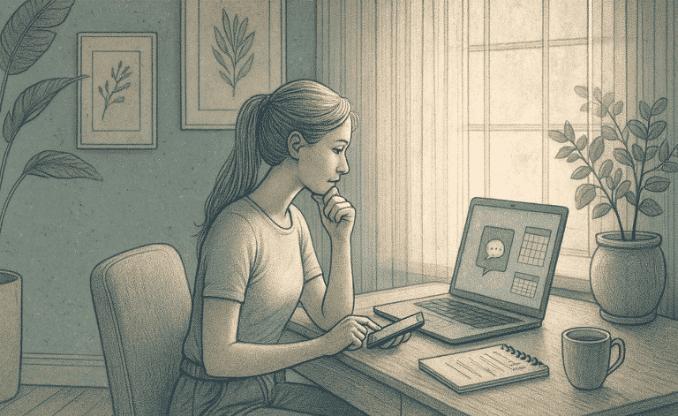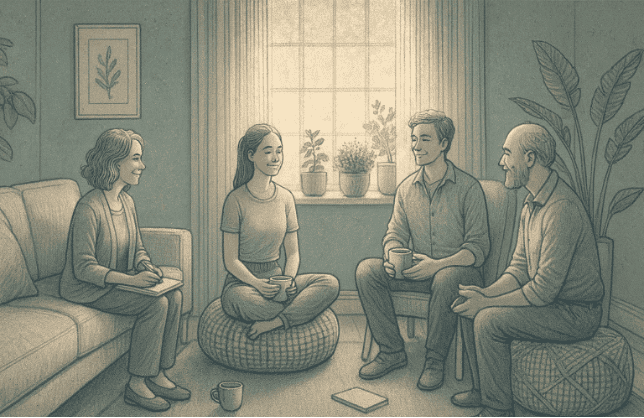
Key Takeaways
- Recognizing when you need support and reaching out for help is a sign of strength, not weakness, and is the most important first step in dealing with mental health problems.
- Professional treatment options like individual therapy, group therapy, and outpatient programs offer evidence-based approaches that effectively address various mental health conditions.
- Building a personal support system of trusted friends, family, and peers reduces isolation and provides essential emotional support during difficult times.
- Practical self-care strategies, including consistent routines, physical wellness habits, mindfulness practices, and healthy boundaries, complement professional treatment and support recovery.
- Mission Connection Healthcare provides comprehensive mental health treatment with multiple therapy options, both in-person and telehealth, making quality care accessible when you need it most.
You Don’t Have to Face Mental Health Challenges Alone
Dealing with mental health problems can feel overwhelming and isolating. You might wake up dreading the day ahead, struggle to concentrate at work, or find yourself withdrawing from people who care about you. Perhaps anxiety makes everyday situations feel impossible, or depression drains the joy from activities you once loved.
These experiences are more common than you might think. Mental health challenges affect millions of people, and experiencing them doesn’t mean you’re broken or weak. What it does mean is that you deserve support, understanding, and effective treatment that can help you feel better.
The good news is that you don’t have to navigate mental health problems alone. Effective treatments exist, resources are available, and countless people have found their way to better mental health with the right support.
Mission Connection offers flexible outpatient care for adults needing more than weekly therapy. Our in-person and telehealth programs include individual, group, and experiential therapy, along with psychiatric care and medication management.
We treat anxiety, depression, trauma, and bipolar disorder using evidence-based approaches like CBT, DBT, mindfulness, and trauma-focused therapies. Designed to fit into daily life, our services provide consistent support without requiring residential care.
Recognizing When You Need Support
One of the hardest parts of dealing with mental health problems is knowing when to seek help. You might wonder if what you’re experiencing is “serious enough” to warrant professional support.
The truth is, you don’t need to wait until you’re in crisis to seek help. If your mental health is affecting your daily life, relationships, work performance, or physical health, it’s time to reach out for support. If you’re consistently feeling overwhelmed, anxious, depressed, or unable to cope with everyday stressors, professional help can make a significant difference.
Trust your instincts about your mental health. If you’re questioning whether you need help, that question itself often indicates that support would be beneficial. Some signs that professional support would be helpful include persistent sadness or hopelessness, excessive worry that interferes with daily activities, significant changes in sleep or appetite, difficulty concentrating, withdrawal from social connections, and loss of interest in activities you usually enjoy.

Professional Treatment Options for Mental Health
Individual Therapy
Individual therapy offers one-on-one support designed for your specific needs and goals. In individual therapy sessions, you work with a therapist to understand patterns in your thoughts, emotions, and behaviors, then develop healthier ways of coping.
Cognitive Behavioral Therapy is one of the most effective approaches for many mental health conditions. CBT helps you identify negative thought patterns that contribute to anxiety, depression, or other challenges, then teaches you to challenge and change these thoughts. You also learn practical behavioral strategies to manage symptoms and improve your daily functioning.
Dialectical Behavior Therapy is particularly helpful for emotional regulation difficulties, relationship challenges, and managing intense emotions. DBT teaches specific skills in mindfulness, distress tolerance, emotion regulation, and interpersonal effectiveness that you can apply in your daily life.
Group Therapy
Group therapy brings together people facing similar mental health challenges in a supportive, therapeutic environment. In group sessions, you connect with others who truly understand what you’re experiencing, reducing the isolation that often accompanies mental health problems.
Group therapy offers unique benefits. You learn from others’ experiences and perspectives, practice interpersonal skills in a safe environment, and realize you’re not alone in your struggles. Many people find that helping others in their group also strengthens their own recovery.
Outpatient Programs
Outpatient treatment programs provide structured, comprehensive support while allowing you to maintain your daily life. These programs typically offer multiple therapy sessions per week, combining individual and group therapy with skill-building activities and psychiatric support when needed.
Outpatient programs work well for people who need more support than weekly therapy alone but don’t require residential treatment. They provide intensive treatment while you continue living at home, working, or attending to family responsibilities.
Telehealth Options
Telehealth therapy makes mental health treatment accessible from wherever you are. Video therapy sessions offer the same therapeutic benefits as in-person appointments while eliminating barriers like transportation, scheduling challenges, or difficulty leaving home during particularly difficult times.
Many people find telehealth especially helpful when anxiety, depression, or other symptoms make leaving home overwhelming. The convenience and privacy of attending therapy from your own space can make it easier to maintain consistent treatment.
Building Your Personal Support System
Professional treatment is essential, but building a personal support system of trusted people in your life provides additional strength during difficult times.
Connecting with Trusted Friends and Family
Opening up to people you trust about your mental health challenges can feel vulnerable, but it often strengthens relationships and reduces isolation. You don’t need to share every detail, but letting trusted friends or family members know you’re struggling allows them to offer support.
Be specific about what kind of support helps you. Maybe you need someone to check in regularly, help with practical tasks when you’re overwhelmed, or simply listen without trying to fix everything. Most people want to help but aren’t sure how, giving them guidance makes it easier.
The Importance of Not Isolating
Mental health challenges often create a strong urge to withdraw and isolate. Depression tells you to stay in bed and avoid people. Anxiety makes social situations feel threatening. While the urge to isolate is understandable, isolation typically worsens mental health symptoms.
Even when it feels difficult, maintaining some level of connection with others supports your recovery. This doesn’t mean forcing yourself into large social gatherings or pretending you’re fine. It might look like texting a friend, taking a short walk with a family member, or attending a support group. Small connections matter.
Peer Support Communities
Peer support groups, both in-person and online, connect you with others who have similar mental health experiences. These communities offer understanding, practical advice from people who’ve been there, and hope that recovery is possible.

Practical Self-Care Strategies That Support Mental Health
Establishing Consistent Routines
Mental health conditions often disrupt your daily structure, making everything feel chaotic and overwhelming. Establishing consistent routines for sleep, meals, and basic self-care provides stability and predictability that support mental wellness.
Start small. Set a regular bedtime and wake time. Plan simple meals. Schedule time for basic hygiene even when motivation is low. These routines become anchors during difficult days and gradually rebuild your capacity for managing daily life.
Physical Wellness Connection
Your physical and mental health are deeply connected. Regular movement, even gentle activities like walking, releases chemicals in your brain that improve mood and reduce anxiety. You don’t need intense workouts—consistent, moderate activity benefits mental health significantly.
Sleep quality profoundly affects mental health. Working with your therapist on sleep hygiene strategies can improve both your sleep and your mental health symptoms. Nutrition also matters. While no specific diet cures mental health conditions, eating regular, balanced meals supports your brain’s ability to function well.
Mindfulness and Stress Reduction
Mindfulness practices help you stay grounded in the present moment rather than ruminating on the past or worrying about the future. Simple mindfulness techniques like focused breathing, body scans, or mindful walking can reduce anxiety and improve emotional regulation.
You don’t need to meditate for hours. Even a few minutes of intentional, focused breathing during stressful moments can make a difference. Many therapy programs teach specific mindfulness skills you can incorporate into daily life.
Setting Healthy Boundaries
Learning to set boundaries protects your mental health and energy. This might mean saying no to commitments when you’re overwhelmed, limiting time with people who drain you, or communicating your needs clearly in relationships.
Boundaries aren’t selfish; they’re necessary for sustainable mental wellness. Your therapist can help you identify where boundaries would be helpful and practice setting them effectively.
Mission Connection Healthcare: Comprehensive Mental Health Support

At Mission Connection Healthcare, we take a warm, whole-person approach to mental health care. Our team of licensed therapists uses trusted, evidence-based methods like Cognitive Behavioral Therapy and Dialectical Behavior Therapy, adapting each session to fit your individual needs and goals.
In one-on-one therapy, you’ll have the space to explore what’s been weighing on you, build practical coping tools, and move toward better emotional balance. Every treatment plan is customized, so you’re getting care that actually fits your life, not a one-size-fits-all approach.
Group therapy adds another layer of support. It connects you with others who understand what you’re going through, helping you learn, share, and grow together in a judgment-free space. Each group is guided by experienced therapists who know how to create safety and trust, making it easier to open up and heal.
We know that getting help should be simple and accessible. That’s why we offer both in-person and telehealth sessions across California, Virginia, and Washington state, so you can choose the option that works best for your lifestyle and comfort.
For those who need deeper support, our outpatient programs provide a structured path toward recovery without stepping away from daily life. These programs blend different therapeutic methods, giving you a balanced and comprehensive care experience while you stay connected to home and work.
Call Today 866-833-1822.
Frequently Asked Questions (FAQ)
How do I know if I need professional help for my mental health?
If your mental health is affecting your daily functioning, relationships, work, or physical health, professional help can make a significant difference. You don’t need to be in crisis to seek support. If you’re questioning whether you need help, that question often indicates that professional support would be beneficial.
What’s the difference between individual and group therapy?
Individual therapy provides one-on-one, personalized treatment focused on your specific needs and goals. Group therapy brings together people with similar challenges in a supportive environment where you learn from others’ experiences and feel less alone. Both are valuable, and many people benefit from combining them.
How long does mental health treatment take?
The timeline varies based on your specific situation, the severity of symptoms, and your treatment goals. Some people notice improvements within a few weeks, while others benefit from longer-term treatment. Your therapist will work with you to assess progress regularly and adjust treatment as needed.
What types of mental health conditions does Mission Connection treat?
Mission Connection Healthcare treats a wide range of mental health conditions, including depression, anxiety disorders, trauma-related conditions, and other challenges affecting daily functioning. We offer evidence-based therapies designed for your specific needs, with both individual and group treatment options available in-person and through telehealth.


